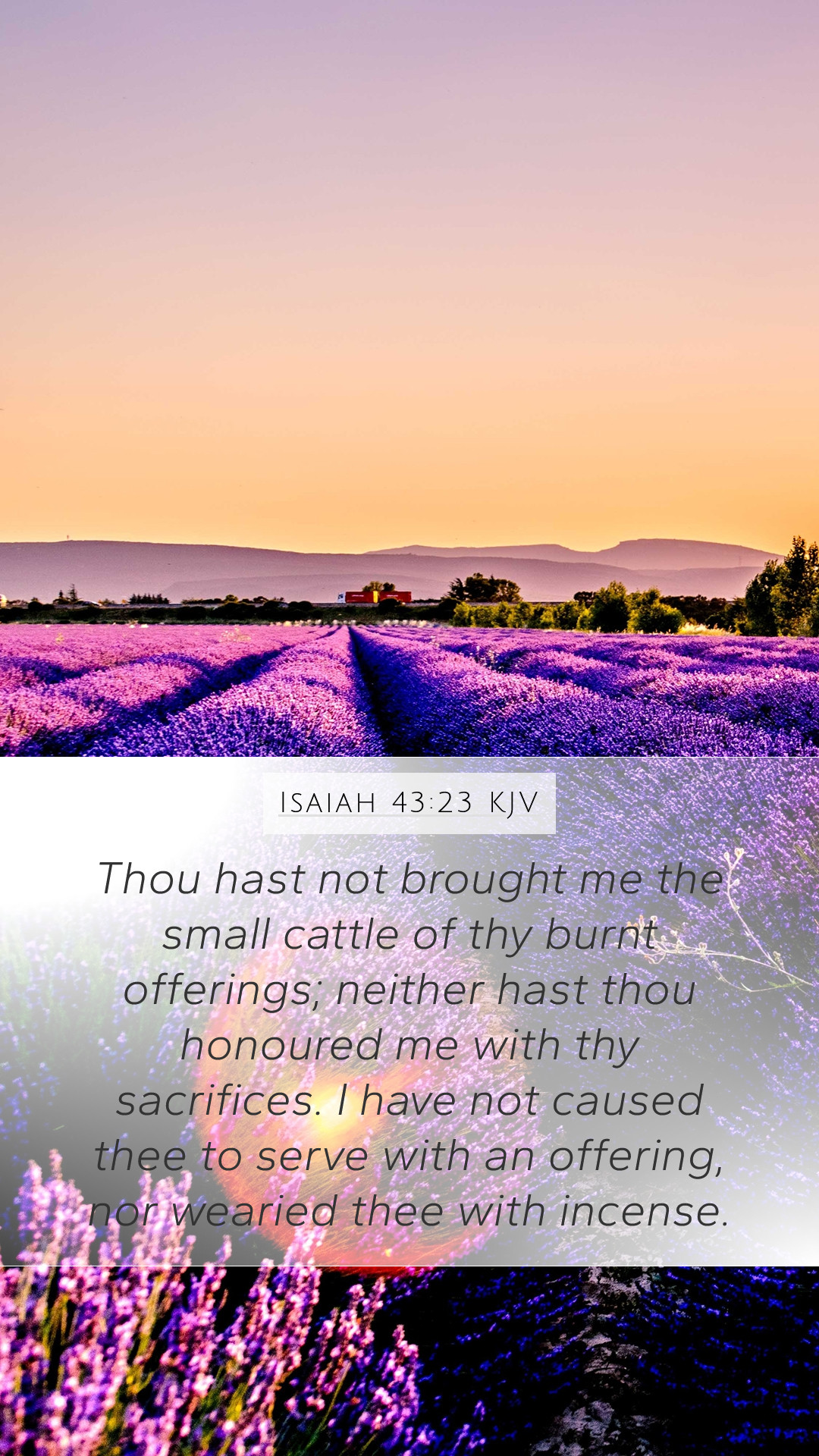Understanding Isaiah 43:23
The verse Isaiah 43:23 states: "You have not brought me your sheep for burnt offerings, nor honored me with your sacrifices. I have not burdened you with demands for grain offerings nor wearied you with demands for incense." This passage invites readers to explore the deeper message conveyed about worship, sacrifice, and the relationship between God and His people.
Summary of Biblical Context
This verse is part of a larger section in the book of Isaiah where God speaks to the Israelites about their relationship with Him. The Israelites, despite being chosen by God, had fallen into a pattern of empty ritual worship, neglecting the true spirit of devotion and obedience required in their covenant with God.
Insights from Commentaries
-
Matthew Henry:
Henry emphasizes that God does not desire mere external acts of worship without sincerity. The lack of genuine devotion is highlighted by the Israelites' failure to bring offerings that please the Lord. True worship is not about the quantity of sacrifices but the quality of the heart that gives.
-
Albert Barnes:
Barnes points out that God reminds Israel of their ingratitude. While they were tasked with making offerings, they neglected to honor God properly. This serves as a warning against complacency and negligence in spiritual practices.
-
Adam Clarke:
Clarke offers an analysis of the expectations from God, noting that God is not exhausted by humans’ demands for ritual offerings. Instead, God seeks a personal relationship with His people, emphasizing that He values worship grounded in sincerity and love, not mere tradition.
Thematic Exploration
The themes that emerge from this verse concern the nature of true worship and the dynamic relationship between God and humanity. Several key aspects arise:
- Genuine Worship: The passage warns against empty rituals and encourages heartfelt devotion.
- Divine Expectations: God desires acknowledgment in actions that reflect love and obedience.
- Relationship Over Ritual: The focus is on building a relationship with God rather than adhering strictly to ritual.
Application for Today's Believers
Isaiah 43:23 serves as a reminder for modern believers to evaluate their worship practices. It invites self-reflection on how one engages with God and the importance of bringing sincerity to their spiritual offerings. Here are some reflections:
- Examine personal worship: Are practices done ritualistically or with sincere intent?
- Seek ways to honor God beyond traditional acts: Consider how daily actions can reflect God’s glory.
- Engage in community: Reflect on the importance of collective worship that is heartfelt and genuine.
Bible Cross References
Several other verses connect with Isaiah 43:23, providing a more comprehensive understanding of its message:
- Malachi 1:10 - Highlights God’s desire for genuine offerings rather than empty rituals.
- Psalm 51:16-17 - Emphasizes that God values a broken spirit over mere sacrifices.
- Hebrews 13:15-16 - Encourages continuous offering of praise and good deeds as true forms of worship.
Conclusion
In summary, Isaiah 43:23 invites believers to reflect on their worship practices and the relationship they have with God. Understanding this verse through the lenses of knowledgeable commentaries enriches our Bible study insights and enhances our comprehension of Scripture. The focus remains on engaging in meaningful worship that stems from sincere hearts, not mere obligation.
FAQs about Bible Verse Interpretations
- What does Isaiah 43:23 mean? It emphasizes the importance of sincere worship over mere ritual.
- What is the significance of this verse? It highlights God’s desire for a genuine relationship with His people.
- How can I apply this verse to my life? By ensuring that your worship and actions reflect sincerity and love toward God.
Further Study Suggestions
For those interested in delving deeper into Bible verse meanings, the following study methods can be beneficial:
- Join Bible study groups that focus on Old Testament teachings.
- Engage in online Bible study forums and discussions.
- Utilize Bible study tools and resources that provide context and commentary.


